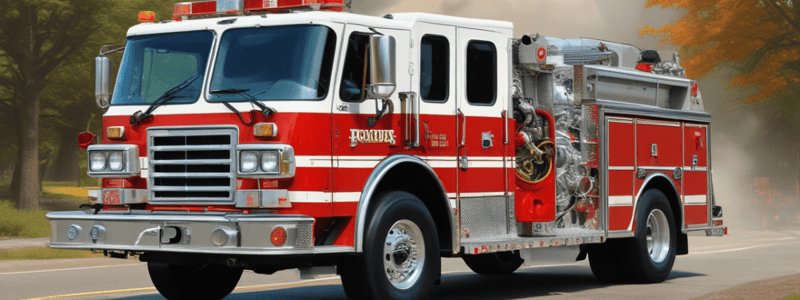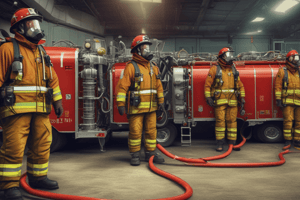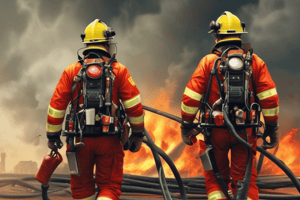Podcast
Questions and Answers
What is a critical aspect of an offensive fire attack?
What is a critical aspect of an offensive fire attack?
- Rapid movement of attack lines (correct)
- Avoiding primary search
- Prioritizing the garage over bedrooms
- Slow movement of attack lines
Which area should be given search priority during an offensive fire attack?
Which area should be given search priority during an offensive fire attack?
- Living room
- Garage
- Bedrooms (correct)
- Kitchen
What should drive hoseline deployment, ventilation, and searches?
What should drive hoseline deployment, ventilation, and searches?
- Time of day
- Fire location and conditions (correct)
- Weather conditions
- Lighting conditions
Where is fire attack best conducted during an attic fire?
Where is fire attack best conducted during an attic fire?
Which action is recommended prior to vertical ventilation in an attic fire?
Which action is recommended prior to vertical ventilation in an attic fire?
When combating attic fires, what should be a high priority?
When combating attic fires, what should be a high priority?
What is the minimum flow requirement when using a 2.25" or 2.5" hose line?
What is the minimum flow requirement when using a 2.25" or 2.5" hose line?
Which of the following conditions is NOT part of the A.D.U.L.T.S. criteria?
Which of the following conditions is NOT part of the A.D.U.L.T.S. criteria?
What percentage of all civilian fire deaths are accounted for by fires in single-family dwellings?
What percentage of all civilian fire deaths are accounted for by fires in single-family dwellings?
Which hoseline is typically used for fire attack operations in most residential fires?
Which hoseline is typically used for fire attack operations in most residential fires?
What does the 'L' in the A.D.U.L.T.S. acronym stand for?
What does the 'L' in the A.D.U.L.T.S. acronym stand for?
Why does the combination of nozzle and hose diameter for the District's 1.75" hoseline exceed the accepted Freeman Ratio?
Why does the combination of nozzle and hose diameter for the District's 1.75" hoseline exceed the accepted Freeman Ratio?
What is often used to separate the garage from the rest of the house?
What is often used to separate the garage from the rest of the house?
Why should personnel secure open garage doors?
Why should personnel secure open garage doors?
What should be assumed about the fire-rated wall between the garage and living areas?
What should be assumed about the fire-rated wall between the garage and living areas?
In the event that the garage door fails, where should the first attack line be advanced?
In the event that the garage door fails, where should the first attack line be advanced?
What potential hazard should be considered due to overhead storage in garage rafters?
What potential hazard should be considered due to overhead storage in garage rafters?
What is the primary reason for the high-fuel load present in garages?
What is the primary reason for the high-fuel load present in garages?
What should be done after confirming there is no fire in concealed spaces?
What should be done after confirming there is no fire in concealed spaces?
When the garage door is intact during a fire, what is one initial step?
When the garage door is intact during a fire, what is one initial step?
What final step should be taken with the garage door after the main body of fire has been cooled?
What final step should be taken with the garage door after the main body of fire has been cooled?
What is a key feature of Garden Apartments?
What is a key feature of Garden Apartments?
Which characteristic defines Townhouse Apartments?
Which characteristic defines Townhouse Apartments?
Which feature is specific to Interior or Center Hallway Apartment Buildings?
Which feature is specific to Interior or Center Hallway Apartment Buildings?
What is a critical factor for managing fire incidents in buildings with multiple units?
What is a critical factor for managing fire incidents in buildings with multiple units?
Which is the primary responsibility of the second arriving engine company?
Which is the primary responsibility of the second arriving engine company?
What should be considered for occupants who are remote from the fire but cannot exit via the interior hallway?
What should be considered for occupants who are remote from the fire but cannot exit via the interior hallway?
What immediate action should be taken if a working fire involves a large portion of the attic?
What immediate action should be taken if a working fire involves a large portion of the attic?
For which buildings are standpipes generally found and utilized?
For which buildings are standpipes generally found and utilized?
What should the fifth arriving engine company do upon arrival?
What should the fifth arriving engine company do upon arrival?
Which of the following materials are older commercial structures most likely made from?
Which of the following materials are older commercial structures most likely made from?
Which challenge is associated with fire fighting in commercial buildings?
Which challenge is associated with fire fighting in commercial buildings?
What can remodels and occupant changes in commercial buildings lead to?
What can remodels and occupant changes in commercial buildings lead to?
How can ventilation be effectively accomplished in commercial buildings?
How can ventilation be effectively accomplished in commercial buildings?
Why is using a rope recommended during firefighting in commercial buildings?
Why is using a rope recommended during firefighting in commercial buildings?
What is the significance of 2.5" hoselines in commercial firefighting?
What is the significance of 2.5" hoselines in commercial firefighting?
What should be opened to provide adequate ventilation in addition to a vertical ventilation roof cut?
What should be opened to provide adequate ventilation in addition to a vertical ventilation roof cut?
How many ladder companies are typically assigned to ventilation at commercial structures?
How many ladder companies are typically assigned to ventilation at commercial structures?
Movement inside a structure in excess of how many feet should be avoided?
Movement inside a structure in excess of how many feet should be avoided?
Why should movement inside a structure be limited to 175 feet?
Why should movement inside a structure be limited to 175 feet?
What should be considered if there is a need to move past 175 feet inside a structure?
What should be considered if there is a need to move past 175 feet inside a structure?
High piled stock inside a structure could hinder what?
High piled stock inside a structure could hinder what?
What should the 5th engine identify the need for?
What should the 5th engine identify the need for?
Where should the 2nd aerial be positioned?
Where should the 2nd aerial be positioned?
Who does the 2nd aerial report to for assignment?
Who does the 2nd aerial report to for assignment?
Study Notes
A.D.U.L.T.S. Criteria
- A.D.U.L.T.S. stands for Advanced fire conditions on arrival, Defensive operations, Undetermined location of fire, Large/compartmented areas, Tons of water needed, and Standpipe operations.
- These criteria are used to determine when to deploy a 2.25" or 2.5" hose line.
Single-Family Dwellings
- Fires in single-family dwellings are the most common structure fires and account for approximately 70% of all civilian fire deaths.
-
Offensive Fire Attack
- Rapid movement of attack lines is critical.
- Complete primary search, prioritizing bedrooms, escape paths, and the immediate fire area.
- Hoseline deployment, ventilation, and searches should be driven by fire location and conditions.
-
Attic Fires
- Attic fires are common and can contribute to rapid deterioration of interior conditions and structural failure.
- Assume the fire has extended to the attic until proven otherwise by direct examination of the attic space.
- Attic fires are usually ventilation-limited, so limiting the number of openings above the fire will control fire growth and development.
- Suppression efforts in the attic are most effective if the attic remains ventilation-limited.
- Once water application has begun, vertical ventilation may help with confinement and extinguishment.
- If the fire entered the attic from the exterior, initial suppression efforts should extinguish the source fire first and follow the fire's path of travel into the attic space.
- Aggressive salvage should be a high priority, and utilize the TIC to identify hot spots.
- Secure utilities early.
-
Attic Fire Plays
- Bottom up: Attack the fire from the interior of the structure by either locating an access or making a small hole to allow for hose stream application.
- Eve attack: Attack the fire through the soffit or bird block, applying water to a majority of the underside of the decking.
Garage Fires
- Fires in attached garages can grow quickly and spread to living areas if not addressed properly.
- The garage has a high-fuel load and can be compared to a small warehouse filled with combustible and flammable material.
- Use caution when operating under open garage doors due to the potential of them coming down or collapsing.
- Secure open garage doors to prevent them from closing on top of or behind firefighters.
- Consider the danger of overhead storage in garage rafters.
-
Garage Fire Plays
- If the garage door has failed, advance the first attack line to the main body of fire for knockdown, and then advance the second attack line inside the residence.
- If the garage door is intact, cut a small triangular hole in the door with the circular saw or break out a window to allow for water application into the garage for initial knockdown.
Primary Search
- Check for extension, and consider PPV to pressurize the house after confirmation that there is no fire in concealed spaces.
Multi-Family Dwellings
- Fires in multi-family dwellings can be complex and challenging incidents.
- These buildings can be broken down into three basic types: garden apartments, townhouse apartments, and interior or center hallway apartment buildings.
- Fire spread between floors can be rapid, and if a large common attic is present, horizontal fire spread can be rapid within it.
Door Safety
- Doors in each unit create the potential for smoke and heat to accumulate in the hallway.
- Open doors compromise egress and access for firefighters.
- Ventilation and searching of hallways is very challenging, especially on lower floors.
Priorities
- Possible rescue, fire attack, and water supply.
- Standpipes are only found on structures four stories or taller.
- The second arriving engine company should ensure a water supply, assist with the first hoseline, and deploy a second hoseline.
- Engine companies establish fire attack and standby teams.
Occupant Rescue vs. Occupant Removal
- In apartment fires with smoke, occupants are often found at balconies or windows.
- Rescue: Residents who are in immediate danger and need immediate rescue.
- Removal: Residents who are probably remote from the actual fire and can be safely evacuated.
Commercial Fires
- Commercial buildings can range in size from small to large and vary in construction type.
- Types of commercial buildings include standalone, buried, "big box" stores, concrete tilt-ups, strip malls, office buildings, and high-rise.
-
Challenges in Commercial Firefighting
- Difficulty in locating and reaching a fire burning deep inside a large commercial building due to limited access.
- Remodels and occupant changes can increase life safety concerns due to limited or unfamiliar exits.
- Changes can create concealed spaces, multiple ceilings, unprotected sprinkler coverage, compromised compartmentalization or fire stops, heavy HVACs, and new plumbing or duct work penetrating floors to allow fire extension from floor to floor.
Tactics for Commercial Buildings
- The importance of locating, confining, and extinguishing the fire remains the same in commercial buildings as it does in residential structures.
- Limited access: Commercial buildings may have limited access to windows and long distances to reach an exterior door.
- Get Lost: The potential to get lost or disoriented is very real.
- Rope: A rope should be considered to ensure a safe means of egress when not operating on a hoseline.
- Sprinkler System Limitations: Unknown type storage and high fire loads piled to the ceiling may limit the capability of the sprinkler system.
- ADULTS Criteria: Evaluate conditions to determine if the ADULTS criteria is present.
- 2.5" Hoselines: The ability to use 2.5" hoselines to knock down a large volume of fire while cooling the area is essential.
- Multiple Fire Companies: Advancing and maneuvering a 2.5" hoseline in a large commercial structure will require at least two companies.
-
Ventilation
- Both horizontal and vertical ventilation are key and must be coordinated to assist advancing hoselines.
- This can often be accomplished by the use of windows on the fire floor or opening exterior doors, such as metal overhead rolling doors.
- Roof scuttles, skylights, or hatches should be opened (in addition to vertical ventilation roof cut) to provide adequate ventilation.
- Typically, both ladder companies will be assigned to ventilation at commercial structures.
- Movement inside a structure: Avoid movement inside a structure in excess of 175 feet, and consider a secondary access point if necessary.
Studying That Suits You
Use AI to generate personalized quizzes and flashcards to suit your learning preferences.
Description
This quiz assesses your knowledge of fire attack operations, focusing on the ideal hoseline diameter and flow capabilities for effective firefighting. Learn about the Freeman Ratio and how it affects nozzle reaction and manpower requirements.



